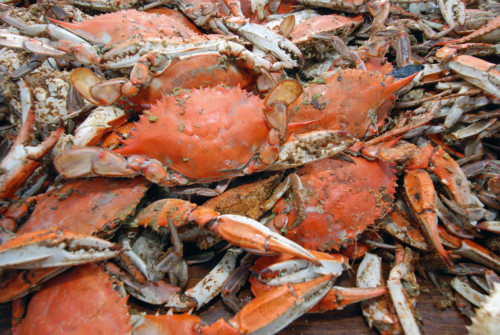 The Oyster Recovery Partnership (ORP) planted 175 million oysters on 55 acres in the Chesapeake Bay during May 2014 as it prepared to celebrate its 20th anniversary of restoring this vital natural resource.
The Oyster Recovery Partnership (ORP) planted 175 million oysters on 55 acres in the Chesapeake Bay during May 2014 as it prepared to celebrate its 20th anniversary of restoring this vital natural resource.
The oyster boat Robert Lee transported the oysters from the Horn Point Laboratory of the University of Maryland Center for Environmental Science in Cambridge to oysters reefs in Harris Creek, the largest oyster restoration project underway along the East Coast. They are the latest of more than 5 billion oysters ORP and its partners have planted during the past two decades.
“This is an exciting time for oysters,” said Stephan Abel, executive director of the ORP. “Oysters are at the center of major water restoration efforts in the Bay and nationwide. Hatcheries are raising billions of oysters to build sanctuaries and boost aquaculture. Restaurants have discovered that serving sustainably raised oysters attracts customers and strengthens their businesses.”
ORP was founded in Maryland in 1994 to bring together scientists, policy makers, watermen and businesses to respond to a critical decline in Chesapeake Bay oysters. Since then ORP has also become a leader in the coordination of and logistics of large scale oyster restoration, shell recycling and other efforts that are helping restore oysters to the Bay. Today the precious oyster has become a renaissance species in the United States, inspiring and uniting scientists, environmentalists, entrepreneurs, fishermen and foodies.
The increased focus on the Chesapeake Bay oyster reflects the speed and depth of the national movement. In the Chesapeake, the nation’s largest estuary, the oyster plays a vital role in habitat restoration with the growing understanding that oyster reefs purify waterways and create ideal habitats for a multitude of commercial and recreational species.
“Of course there is still much work to be done,” Abel said. “But over the past 20 years, the partnership of government, environmental, seafood and business communities have produced remarkable results. We are demonstrating that working together we can make a difference. We at ORP are happy to be part of the turnaround in the oyster population.”
Over the years, ORP has worked with individual experts and management agencies, including the National Oceanic and Atmospheric Administration (NOAA), the U.S. Army Corps of Engineers and the Maryland Department of Natural Resources, to assist with restoration, substrate planting, monitoring and funding. Also vital are environmental organizations, such as the Chesapeake Bay Foundation and The Nature Conservancy. We are also appreciative of the Maryland Watermen’s Association, whose members have the boats, equipment and knowledge of the Bay to bring local experience and expertise to the projects. ORP’s restoration program would not be possible without the hardworking scientists and hatchery crew at the University of Maryland Center for Environmental Science Horn Point Lab Hatchery, who have substantially increased oyster hatchery capabilities to reach record-breaking spat-on-shell production numbers year after year.
ORP hosted a 20th anniversary party June 4 at the Severn Sailing Association in Annapolis to celebrate the efforts by the various groups and individuals who have been influential in oyster restoration efforts during the past 20 years.
A few 20th Anniversary numbers that ORP and its partners are proud of:
- We have planted more than 5 billion oysters in the Bay and its tributaries.
- We have worked to restore and manage more than 1,600 acres of oyster reefs.
- We have created a Shell Recycling Alliance of more than 225 seafood business that has recycled more than30,000 bushels of shells on which to raise new oysters.
- We have helped more than 50 watermen and aquaculturists create new or expand existing oyster farms.
[do action=”schuh”/]












































